Environmental Sustainability Plan for Hotel Independent - Final Report
VerifiedAdded on 2022/09/18
|10
|2233
|25
Report
AI Summary
This Environmental Sustainability Plan outlines a comprehensive strategy for Hotel Independent, focusing on integrating eco-friendly practices to achieve financial benefits and attract an environmentally conscious market. The plan begins with an overview of the financial incentives for sustainability in the tourism industry, emphasizing increased efficiency, improved profitability, and enhanced brand reputation. It then details a four-level model, starting with ethical principles and progressing to measurable objectives, performance indicators, and implementation strategies. The plan covers key areas, including guest rooms (energy and water conservation, green building practices), guest services (automation, sustainable transportation), food and beverage (reducing waste, local sourcing), and administration/supply chain (waste management, eco-friendly purchasing). The plan emphasizes practical steps like installing smart showers, using solar power, reducing plastic use, and sourcing local products to minimize environmental impact and maximize cost savings. By implementing these strategies, Hotel Independent aims to become a leader in sustainable tourism, attracting both business and personal travelers seeking eco-friendly accommodations and services. The report also provides a literature review that supports the arguments and recommendations.
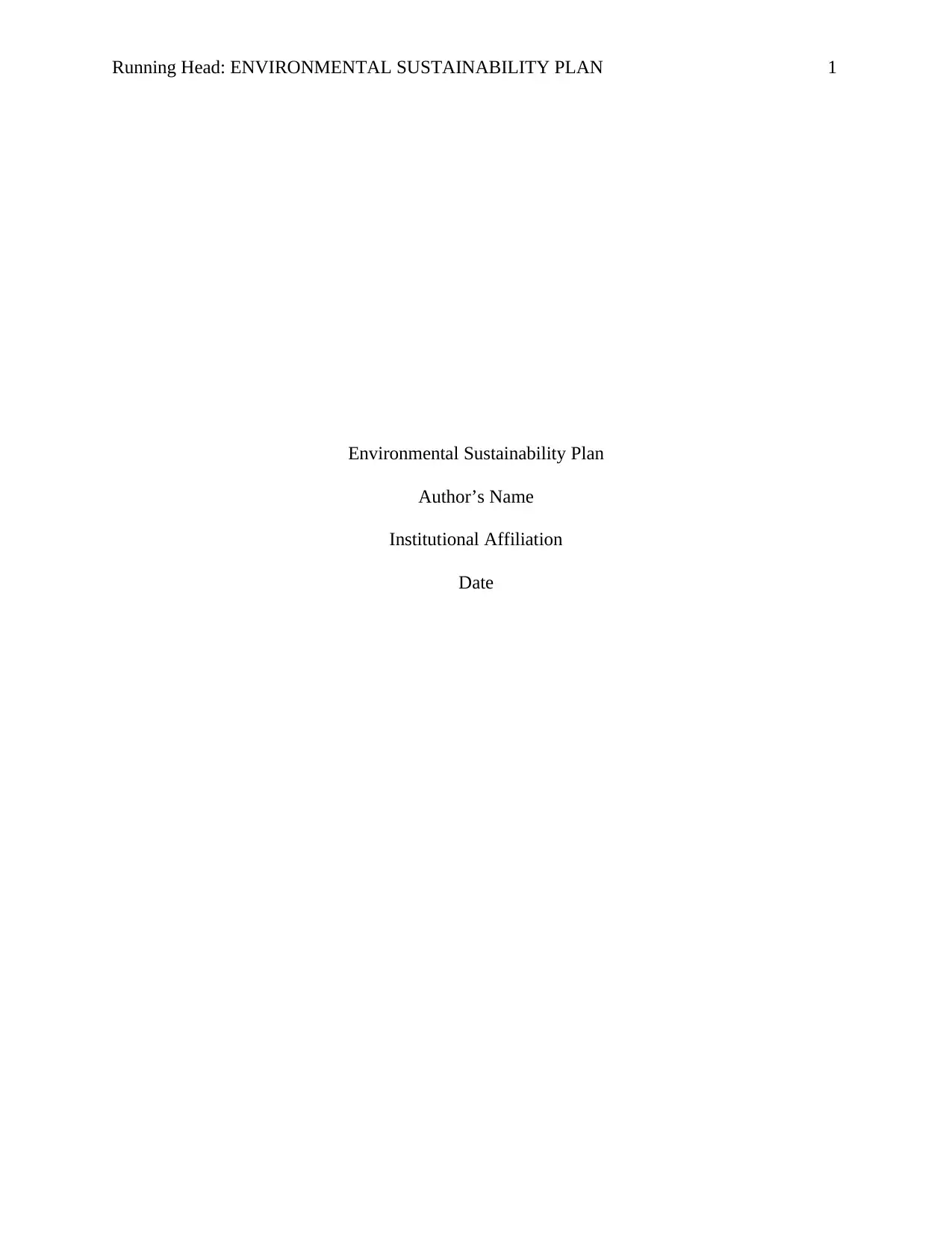
Running Head: ENVIRONMENTAL SUSTAINABILITY PLAN 1
Environmental Sustainability Plan
Author’s Name
Institutional Affiliation
Date
Environmental Sustainability Plan
Author’s Name
Institutional Affiliation
Date
Paraphrase This Document
Need a fresh take? Get an instant paraphrase of this document with our AI Paraphraser
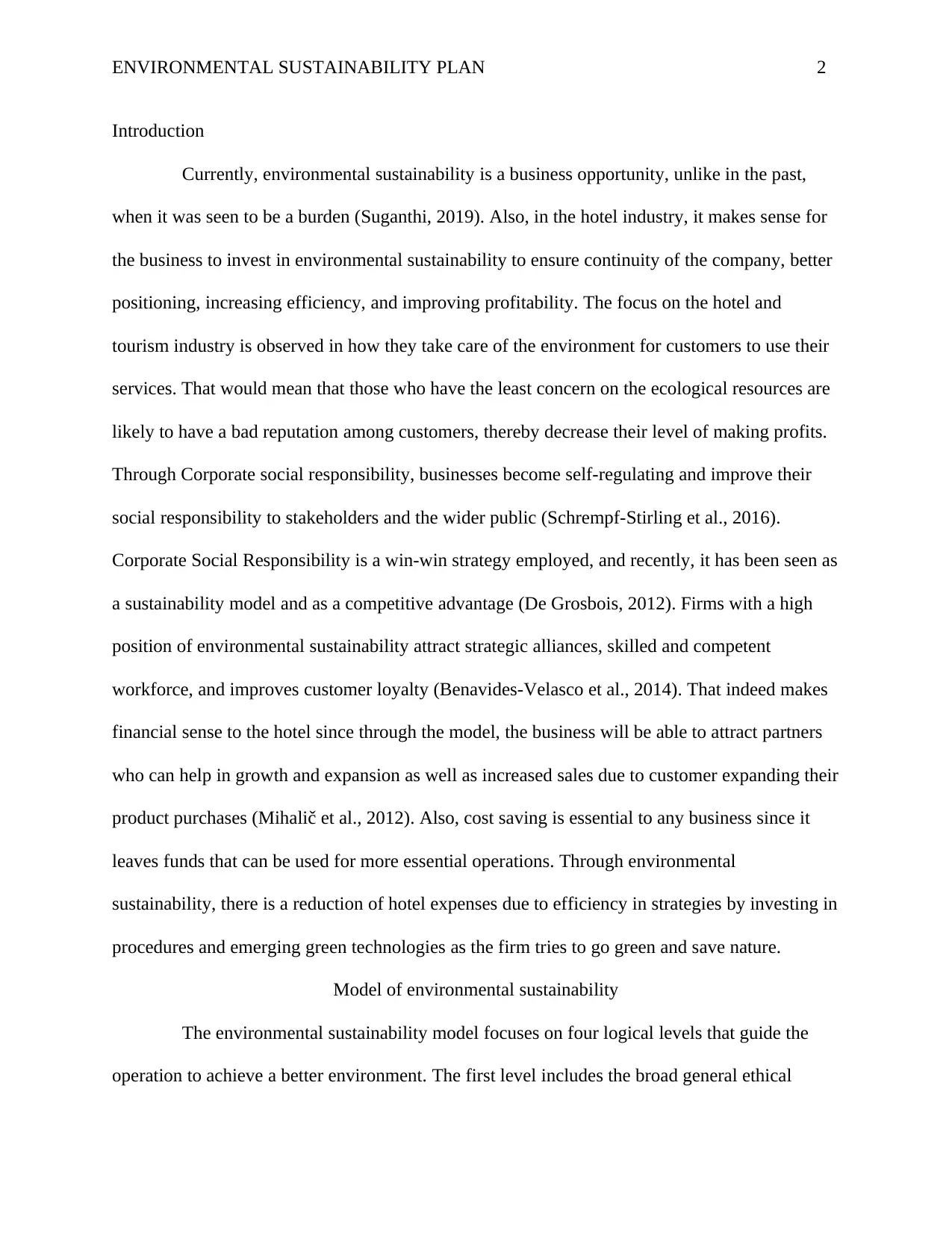
ENVIRONMENTAL SUSTAINABILITY PLAN 2
Introduction
Currently, environmental sustainability is a business opportunity, unlike in the past,
when it was seen to be a burden (Suganthi, 2019). Also, in the hotel industry, it makes sense for
the business to invest in environmental sustainability to ensure continuity of the company, better
positioning, increasing efficiency, and improving profitability. The focus on the hotel and
tourism industry is observed in how they take care of the environment for customers to use their
services. That would mean that those who have the least concern on the ecological resources are
likely to have a bad reputation among customers, thereby decrease their level of making profits.
Through Corporate social responsibility, businesses become self-regulating and improve their
social responsibility to stakeholders and the wider public (Schrempf-Stirling et al., 2016).
Corporate Social Responsibility is a win-win strategy employed, and recently, it has been seen as
a sustainability model and as a competitive advantage (De Grosbois, 2012). Firms with a high
position of environmental sustainability attract strategic alliances, skilled and competent
workforce, and improves customer loyalty (Benavides-Velasco et al., 2014). That indeed makes
financial sense to the hotel since through the model, the business will be able to attract partners
who can help in growth and expansion as well as increased sales due to customer expanding their
product purchases (Mihalič et al., 2012). Also, cost saving is essential to any business since it
leaves funds that can be used for more essential operations. Through environmental
sustainability, there is a reduction of hotel expenses due to efficiency in strategies by investing in
procedures and emerging green technologies as the firm tries to go green and save nature.
Model of environmental sustainability
The environmental sustainability model focuses on four logical levels that guide the
operation to achieve a better environment. The first level includes the broad general ethical
Introduction
Currently, environmental sustainability is a business opportunity, unlike in the past,
when it was seen to be a burden (Suganthi, 2019). Also, in the hotel industry, it makes sense for
the business to invest in environmental sustainability to ensure continuity of the company, better
positioning, increasing efficiency, and improving profitability. The focus on the hotel and
tourism industry is observed in how they take care of the environment for customers to use their
services. That would mean that those who have the least concern on the ecological resources are
likely to have a bad reputation among customers, thereby decrease their level of making profits.
Through Corporate social responsibility, businesses become self-regulating and improve their
social responsibility to stakeholders and the wider public (Schrempf-Stirling et al., 2016).
Corporate Social Responsibility is a win-win strategy employed, and recently, it has been seen as
a sustainability model and as a competitive advantage (De Grosbois, 2012). Firms with a high
position of environmental sustainability attract strategic alliances, skilled and competent
workforce, and improves customer loyalty (Benavides-Velasco et al., 2014). That indeed makes
financial sense to the hotel since through the model, the business will be able to attract partners
who can help in growth and expansion as well as increased sales due to customer expanding their
product purchases (Mihalič et al., 2012). Also, cost saving is essential to any business since it
leaves funds that can be used for more essential operations. Through environmental
sustainability, there is a reduction of hotel expenses due to efficiency in strategies by investing in
procedures and emerging green technologies as the firm tries to go green and save nature.
Model of environmental sustainability
The environmental sustainability model focuses on four logical levels that guide the
operation to achieve a better environment. The first level includes the broad general ethical
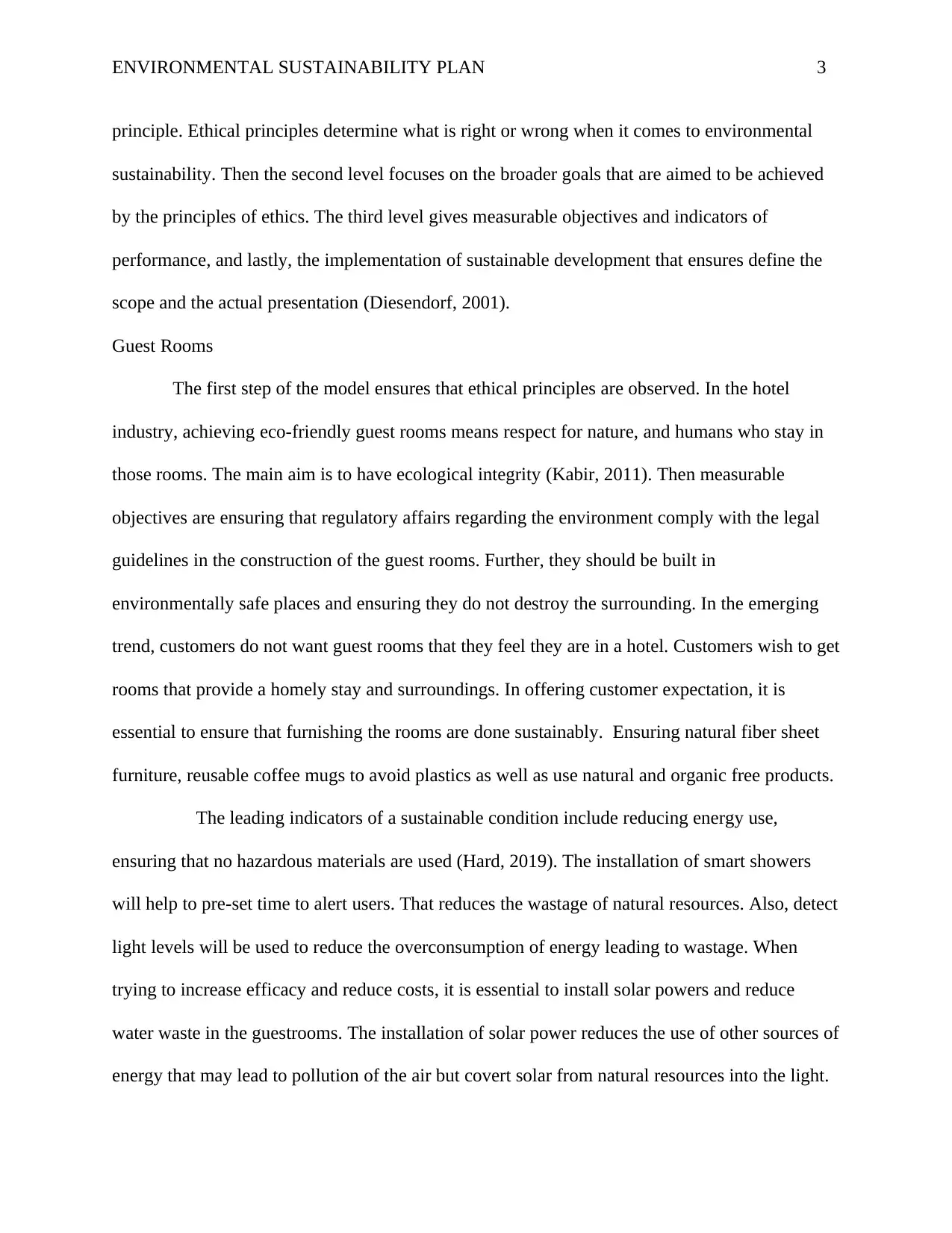
ENVIRONMENTAL SUSTAINABILITY PLAN 3
principle. Ethical principles determine what is right or wrong when it comes to environmental
sustainability. Then the second level focuses on the broader goals that are aimed to be achieved
by the principles of ethics. The third level gives measurable objectives and indicators of
performance, and lastly, the implementation of sustainable development that ensures define the
scope and the actual presentation (Diesendorf, 2001).
Guest Rooms
The first step of the model ensures that ethical principles are observed. In the hotel
industry, achieving eco-friendly guest rooms means respect for nature, and humans who stay in
those rooms. The main aim is to have ecological integrity (Kabir, 2011). Then measurable
objectives are ensuring that regulatory affairs regarding the environment comply with the legal
guidelines in the construction of the guest rooms. Further, they should be built in
environmentally safe places and ensuring they do not destroy the surrounding. In the emerging
trend, customers do not want guest rooms that they feel they are in a hotel. Customers wish to get
rooms that provide a homely stay and surroundings. In offering customer expectation, it is
essential to ensure that furnishing the rooms are done sustainably. Ensuring natural fiber sheet
furniture, reusable coffee mugs to avoid plastics as well as use natural and organic free products.
The leading indicators of a sustainable condition include reducing energy use,
ensuring that no hazardous materials are used (Hard, 2019). The installation of smart showers
will help to pre-set time to alert users. That reduces the wastage of natural resources. Also, detect
light levels will be used to reduce the overconsumption of energy leading to wastage. When
trying to increase efficacy and reduce costs, it is essential to install solar powers and reduce
water waste in the guestrooms. The installation of solar power reduces the use of other sources of
energy that may lead to pollution of the air but covert solar from natural resources into the light.
principle. Ethical principles determine what is right or wrong when it comes to environmental
sustainability. Then the second level focuses on the broader goals that are aimed to be achieved
by the principles of ethics. The third level gives measurable objectives and indicators of
performance, and lastly, the implementation of sustainable development that ensures define the
scope and the actual presentation (Diesendorf, 2001).
Guest Rooms
The first step of the model ensures that ethical principles are observed. In the hotel
industry, achieving eco-friendly guest rooms means respect for nature, and humans who stay in
those rooms. The main aim is to have ecological integrity (Kabir, 2011). Then measurable
objectives are ensuring that regulatory affairs regarding the environment comply with the legal
guidelines in the construction of the guest rooms. Further, they should be built in
environmentally safe places and ensuring they do not destroy the surrounding. In the emerging
trend, customers do not want guest rooms that they feel they are in a hotel. Customers wish to get
rooms that provide a homely stay and surroundings. In offering customer expectation, it is
essential to ensure that furnishing the rooms are done sustainably. Ensuring natural fiber sheet
furniture, reusable coffee mugs to avoid plastics as well as use natural and organic free products.
The leading indicators of a sustainable condition include reducing energy use,
ensuring that no hazardous materials are used (Hard, 2019). The installation of smart showers
will help to pre-set time to alert users. That reduces the wastage of natural resources. Also, detect
light levels will be used to reduce the overconsumption of energy leading to wastage. When
trying to increase efficacy and reduce costs, it is essential to install solar powers and reduce
water waste in the guestrooms. The installation of solar power reduces the use of other sources of
energy that may lead to pollution of the air but covert solar from natural resources into the light.
⊘ This is a preview!⊘
Do you want full access?
Subscribe today to unlock all pages.

Trusted by 1+ million students worldwide
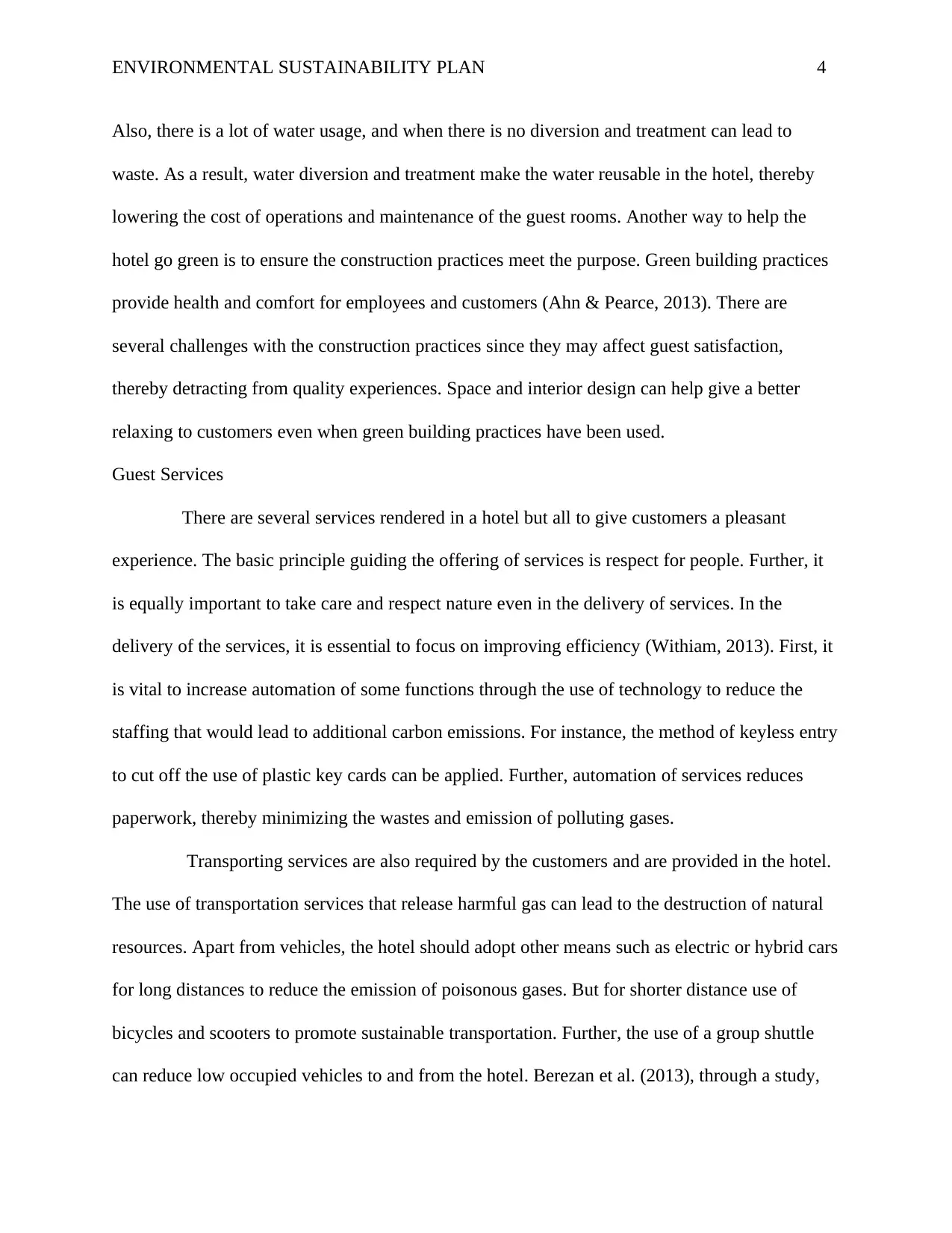
ENVIRONMENTAL SUSTAINABILITY PLAN 4
Also, there is a lot of water usage, and when there is no diversion and treatment can lead to
waste. As a result, water diversion and treatment make the water reusable in the hotel, thereby
lowering the cost of operations and maintenance of the guest rooms. Another way to help the
hotel go green is to ensure the construction practices meet the purpose. Green building practices
provide health and comfort for employees and customers (Ahn & Pearce, 2013). There are
several challenges with the construction practices since they may affect guest satisfaction,
thereby detracting from quality experiences. Space and interior design can help give a better
relaxing to customers even when green building practices have been used.
Guest Services
There are several services rendered in a hotel but all to give customers a pleasant
experience. The basic principle guiding the offering of services is respect for people. Further, it
is equally important to take care and respect nature even in the delivery of services. In the
delivery of the services, it is essential to focus on improving efficiency (Withiam, 2013). First, it
is vital to increase automation of some functions through the use of technology to reduce the
staffing that would lead to additional carbon emissions. For instance, the method of keyless entry
to cut off the use of plastic key cards can be applied. Further, automation of services reduces
paperwork, thereby minimizing the wastes and emission of polluting gases.
Transporting services are also required by the customers and are provided in the hotel.
The use of transportation services that release harmful gas can lead to the destruction of natural
resources. Apart from vehicles, the hotel should adopt other means such as electric or hybrid cars
for long distances to reduce the emission of poisonous gases. But for shorter distance use of
bicycles and scooters to promote sustainable transportation. Further, the use of a group shuttle
can reduce low occupied vehicles to and from the hotel. Berezan et al. (2013), through a study,
Also, there is a lot of water usage, and when there is no diversion and treatment can lead to
waste. As a result, water diversion and treatment make the water reusable in the hotel, thereby
lowering the cost of operations and maintenance of the guest rooms. Another way to help the
hotel go green is to ensure the construction practices meet the purpose. Green building practices
provide health and comfort for employees and customers (Ahn & Pearce, 2013). There are
several challenges with the construction practices since they may affect guest satisfaction,
thereby detracting from quality experiences. Space and interior design can help give a better
relaxing to customers even when green building practices have been used.
Guest Services
There are several services rendered in a hotel but all to give customers a pleasant
experience. The basic principle guiding the offering of services is respect for people. Further, it
is equally important to take care and respect nature even in the delivery of services. In the
delivery of the services, it is essential to focus on improving efficiency (Withiam, 2013). First, it
is vital to increase automation of some functions through the use of technology to reduce the
staffing that would lead to additional carbon emissions. For instance, the method of keyless entry
to cut off the use of plastic key cards can be applied. Further, automation of services reduces
paperwork, thereby minimizing the wastes and emission of polluting gases.
Transporting services are also required by the customers and are provided in the hotel.
The use of transportation services that release harmful gas can lead to the destruction of natural
resources. Apart from vehicles, the hotel should adopt other means such as electric or hybrid cars
for long distances to reduce the emission of poisonous gases. But for shorter distance use of
bicycles and scooters to promote sustainable transportation. Further, the use of a group shuttle
can reduce low occupied vehicles to and from the hotel. Berezan et al. (2013), through a study,
Paraphrase This Document
Need a fresh take? Get an instant paraphrase of this document with our AI Paraphraser
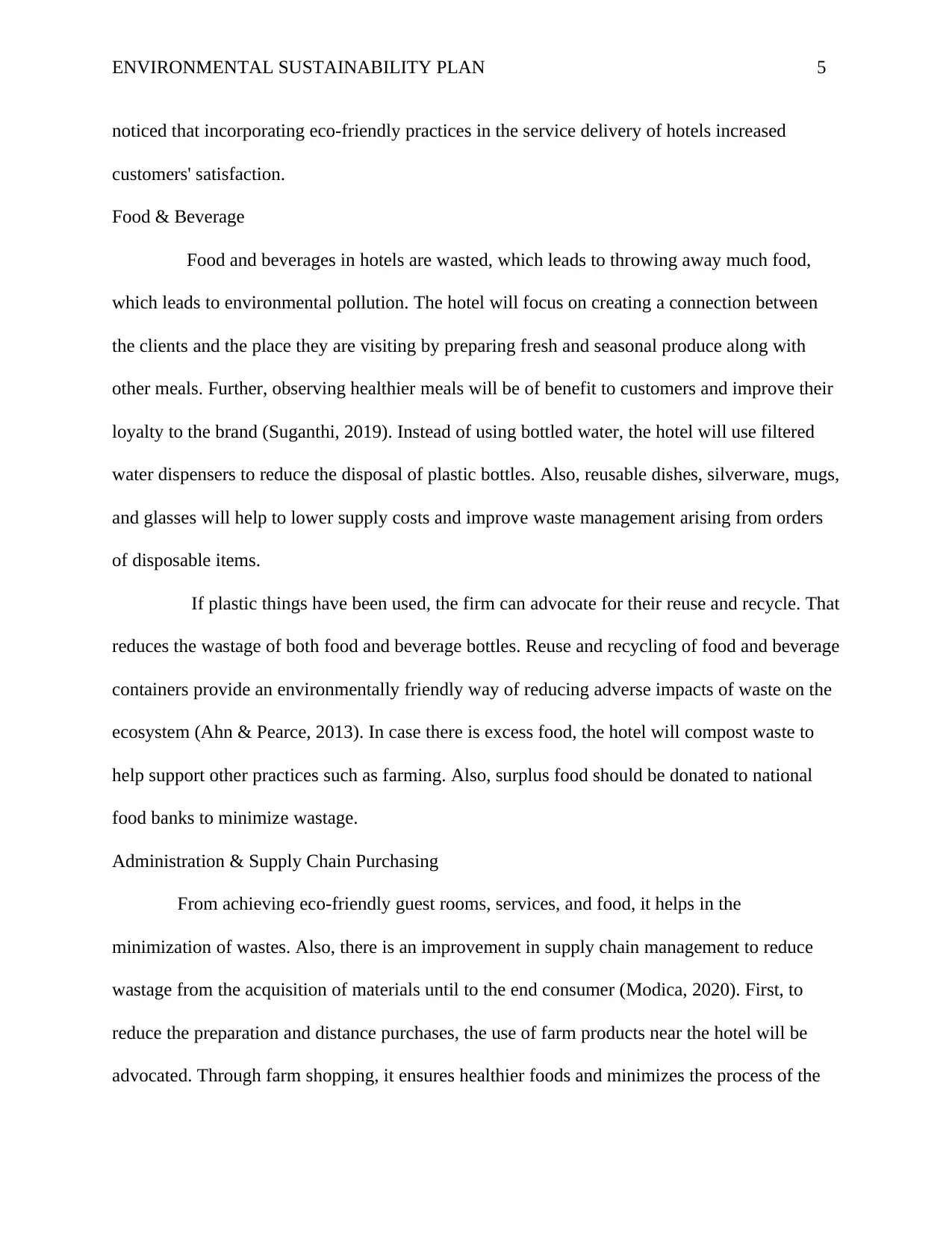
ENVIRONMENTAL SUSTAINABILITY PLAN 5
noticed that incorporating eco-friendly practices in the service delivery of hotels increased
customers' satisfaction.
Food & Beverage
Food and beverages in hotels are wasted, which leads to throwing away much food,
which leads to environmental pollution. The hotel will focus on creating a connection between
the clients and the place they are visiting by preparing fresh and seasonal produce along with
other meals. Further, observing healthier meals will be of benefit to customers and improve their
loyalty to the brand (Suganthi, 2019). Instead of using bottled water, the hotel will use filtered
water dispensers to reduce the disposal of plastic bottles. Also, reusable dishes, silverware, mugs,
and glasses will help to lower supply costs and improve waste management arising from orders
of disposable items.
If plastic things have been used, the firm can advocate for their reuse and recycle. That
reduces the wastage of both food and beverage bottles. Reuse and recycling of food and beverage
containers provide an environmentally friendly way of reducing adverse impacts of waste on the
ecosystem (Ahn & Pearce, 2013). In case there is excess food, the hotel will compost waste to
help support other practices such as farming. Also, surplus food should be donated to national
food banks to minimize wastage.
Administration & Supply Chain Purchasing
From achieving eco-friendly guest rooms, services, and food, it helps in the
minimization of wastes. Also, there is an improvement in supply chain management to reduce
wastage from the acquisition of materials until to the end consumer (Modica, 2020). First, to
reduce the preparation and distance purchases, the use of farm products near the hotel will be
advocated. Through farm shopping, it ensures healthier foods and minimizes the process of the
noticed that incorporating eco-friendly practices in the service delivery of hotels increased
customers' satisfaction.
Food & Beverage
Food and beverages in hotels are wasted, which leads to throwing away much food,
which leads to environmental pollution. The hotel will focus on creating a connection between
the clients and the place they are visiting by preparing fresh and seasonal produce along with
other meals. Further, observing healthier meals will be of benefit to customers and improve their
loyalty to the brand (Suganthi, 2019). Instead of using bottled water, the hotel will use filtered
water dispensers to reduce the disposal of plastic bottles. Also, reusable dishes, silverware, mugs,
and glasses will help to lower supply costs and improve waste management arising from orders
of disposable items.
If plastic things have been used, the firm can advocate for their reuse and recycle. That
reduces the wastage of both food and beverage bottles. Reuse and recycling of food and beverage
containers provide an environmentally friendly way of reducing adverse impacts of waste on the
ecosystem (Ahn & Pearce, 2013). In case there is excess food, the hotel will compost waste to
help support other practices such as farming. Also, surplus food should be donated to national
food banks to minimize wastage.
Administration & Supply Chain Purchasing
From achieving eco-friendly guest rooms, services, and food, it helps in the
minimization of wastes. Also, there is an improvement in supply chain management to reduce
wastage from the acquisition of materials until to the end consumer (Modica, 2020). First, to
reduce the preparation and distance purchases, the use of farm products near the hotel will be
advocated. Through farm shopping, it ensures healthier foods and minimizes the process of the
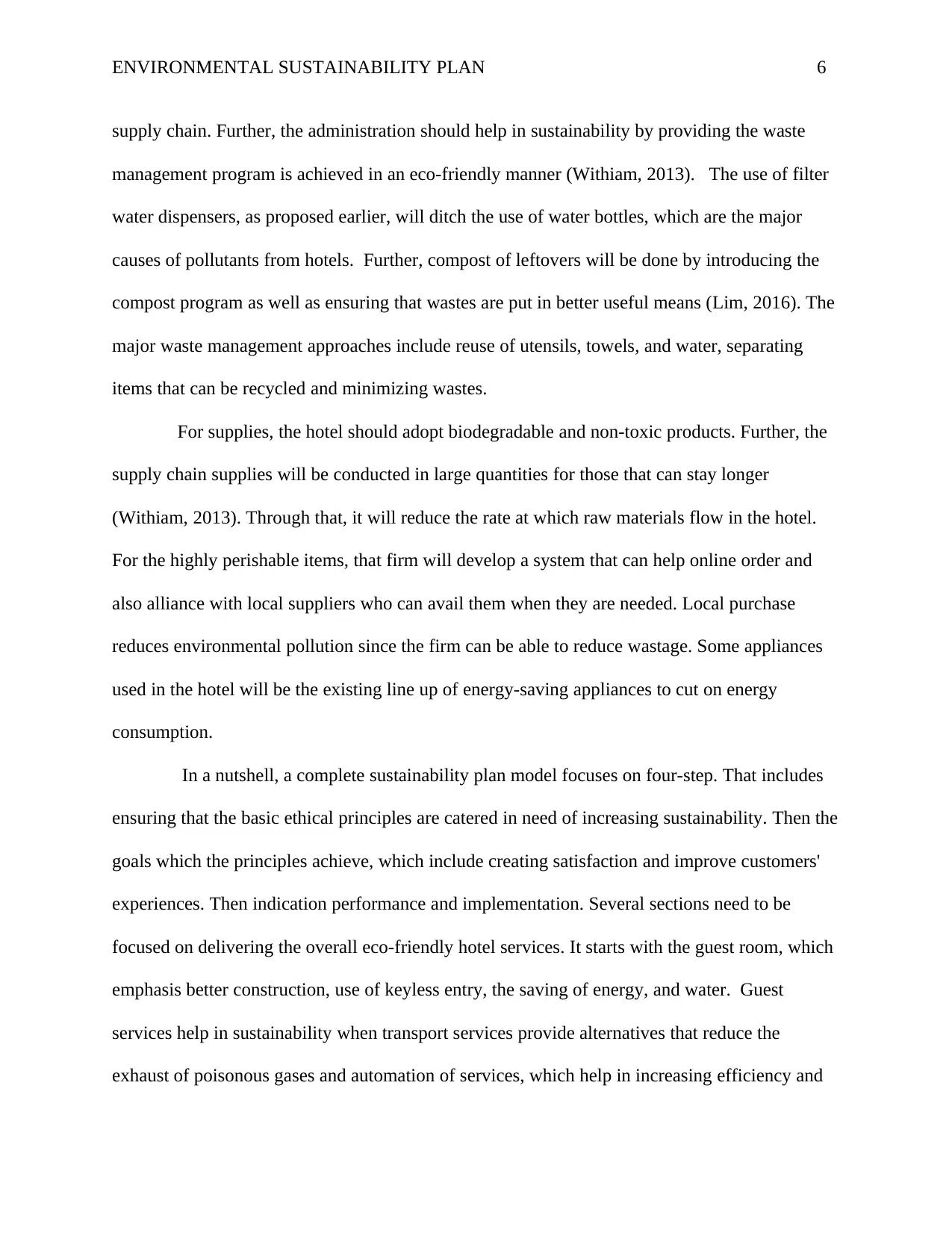
ENVIRONMENTAL SUSTAINABILITY PLAN 6
supply chain. Further, the administration should help in sustainability by providing the waste
management program is achieved in an eco-friendly manner (Withiam, 2013). The use of filter
water dispensers, as proposed earlier, will ditch the use of water bottles, which are the major
causes of pollutants from hotels. Further, compost of leftovers will be done by introducing the
compost program as well as ensuring that wastes are put in better useful means (Lim, 2016). The
major waste management approaches include reuse of utensils, towels, and water, separating
items that can be recycled and minimizing wastes.
For supplies, the hotel should adopt biodegradable and non-toxic products. Further, the
supply chain supplies will be conducted in large quantities for those that can stay longer
(Withiam, 2013). Through that, it will reduce the rate at which raw materials flow in the hotel.
For the highly perishable items, that firm will develop a system that can help online order and
also alliance with local suppliers who can avail them when they are needed. Local purchase
reduces environmental pollution since the firm can be able to reduce wastage. Some appliances
used in the hotel will be the existing line up of energy-saving appliances to cut on energy
consumption.
In a nutshell, a complete sustainability plan model focuses on four-step. That includes
ensuring that the basic ethical principles are catered in need of increasing sustainability. Then the
goals which the principles achieve, which include creating satisfaction and improve customers'
experiences. Then indication performance and implementation. Several sections need to be
focused on delivering the overall eco-friendly hotel services. It starts with the guest room, which
emphasis better construction, use of keyless entry, the saving of energy, and water. Guest
services help in sustainability when transport services provide alternatives that reduce the
exhaust of poisonous gases and automation of services, which help in increasing efficiency and
supply chain. Further, the administration should help in sustainability by providing the waste
management program is achieved in an eco-friendly manner (Withiam, 2013). The use of filter
water dispensers, as proposed earlier, will ditch the use of water bottles, which are the major
causes of pollutants from hotels. Further, compost of leftovers will be done by introducing the
compost program as well as ensuring that wastes are put in better useful means (Lim, 2016). The
major waste management approaches include reuse of utensils, towels, and water, separating
items that can be recycled and minimizing wastes.
For supplies, the hotel should adopt biodegradable and non-toxic products. Further, the
supply chain supplies will be conducted in large quantities for those that can stay longer
(Withiam, 2013). Through that, it will reduce the rate at which raw materials flow in the hotel.
For the highly perishable items, that firm will develop a system that can help online order and
also alliance with local suppliers who can avail them when they are needed. Local purchase
reduces environmental pollution since the firm can be able to reduce wastage. Some appliances
used in the hotel will be the existing line up of energy-saving appliances to cut on energy
consumption.
In a nutshell, a complete sustainability plan model focuses on four-step. That includes
ensuring that the basic ethical principles are catered in need of increasing sustainability. Then the
goals which the principles achieve, which include creating satisfaction and improve customers'
experiences. Then indication performance and implementation. Several sections need to be
focused on delivering the overall eco-friendly hotel services. It starts with the guest room, which
emphasis better construction, use of keyless entry, the saving of energy, and water. Guest
services help in sustainability when transport services provide alternatives that reduce the
exhaust of poisonous gases and automation of services, which help in increasing efficiency and
⊘ This is a preview!⊘
Do you want full access?
Subscribe today to unlock all pages.

Trusted by 1+ million students worldwide

ENVIRONMENTAL SUSTAINABILITY PLAN 7
reducing the number of staffing. Food and beverage focus on using a filter water dispenser and
reusable mugs and glass to ditch plastics. The supply chain purchases should buy in large
quantities and shop locally to reduce the rate of flow for raw materials.
reducing the number of staffing. Food and beverage focus on using a filter water dispenser and
reusable mugs and glass to ditch plastics. The supply chain purchases should buy in large
quantities and shop locally to reduce the rate of flow for raw materials.
Paraphrase This Document
Need a fresh take? Get an instant paraphrase of this document with our AI Paraphraser
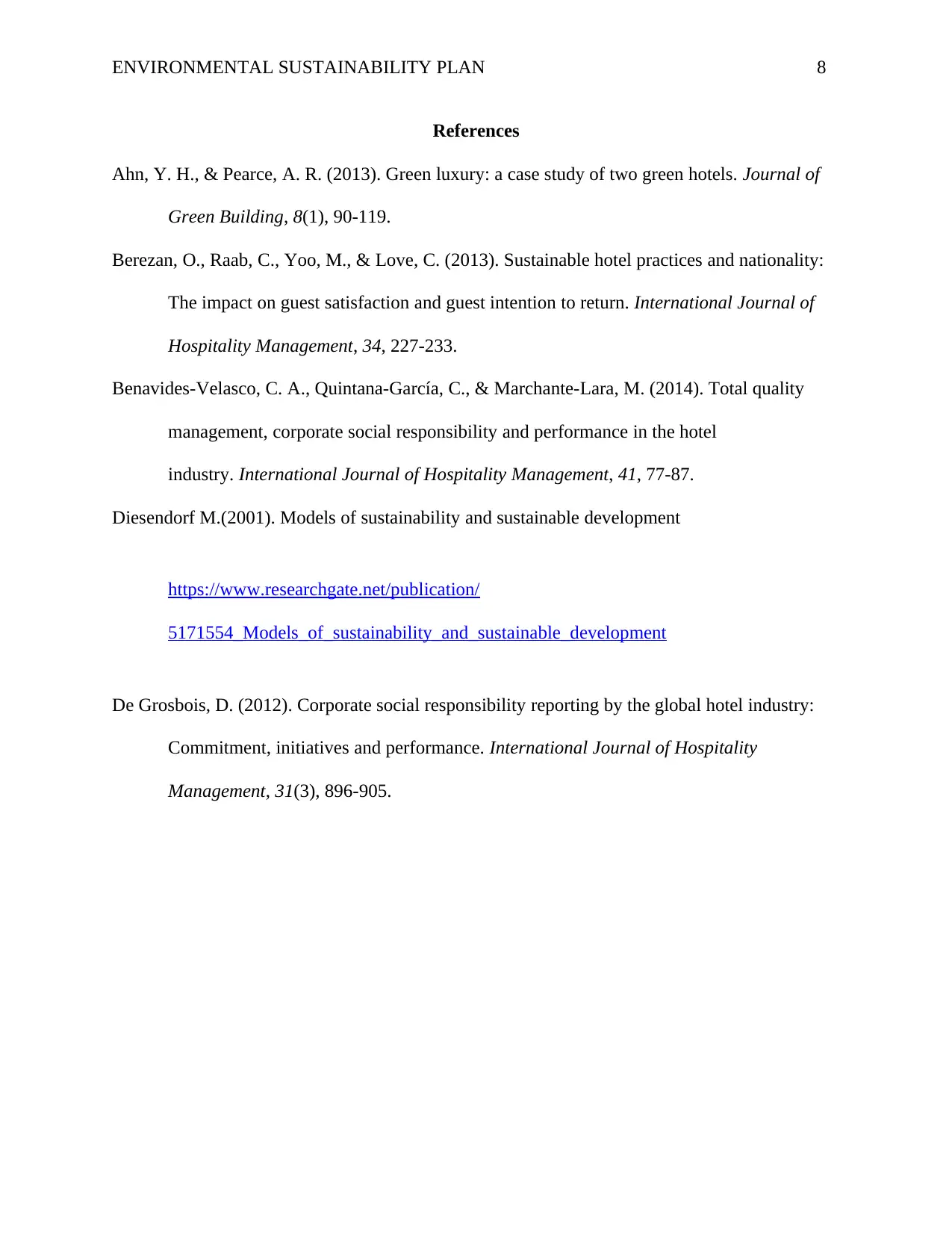
ENVIRONMENTAL SUSTAINABILITY PLAN 8
References
Ahn, Y. H., & Pearce, A. R. (2013). Green luxury: a case study of two green hotels. Journal of
Green Building, 8(1), 90-119.
Berezan, O., Raab, C., Yoo, M., & Love, C. (2013). Sustainable hotel practices and nationality:
The impact on guest satisfaction and guest intention to return. International Journal of
Hospitality Management, 34, 227-233.
Benavides-Velasco, C. A., Quintana-García, C., & Marchante-Lara, M. (2014). Total quality
management, corporate social responsibility and performance in the hotel
industry. International Journal of Hospitality Management, 41, 77-87.
Diesendorf M.(2001). Models of sustainability and sustainable development
https://www.researchgate.net/publication/
5171554_Models_of_sustainability_and_sustainable_development
De Grosbois, D. (2012). Corporate social responsibility reporting by the global hotel industry:
Commitment, initiatives and performance. International Journal of Hospitality
Management, 31(3), 896-905.
References
Ahn, Y. H., & Pearce, A. R. (2013). Green luxury: a case study of two green hotels. Journal of
Green Building, 8(1), 90-119.
Berezan, O., Raab, C., Yoo, M., & Love, C. (2013). Sustainable hotel practices and nationality:
The impact on guest satisfaction and guest intention to return. International Journal of
Hospitality Management, 34, 227-233.
Benavides-Velasco, C. A., Quintana-García, C., & Marchante-Lara, M. (2014). Total quality
management, corporate social responsibility and performance in the hotel
industry. International Journal of Hospitality Management, 41, 77-87.
Diesendorf M.(2001). Models of sustainability and sustainable development
https://www.researchgate.net/publication/
5171554_Models_of_sustainability_and_sustainable_development
De Grosbois, D. (2012). Corporate social responsibility reporting by the global hotel industry:
Commitment, initiatives and performance. International Journal of Hospitality
Management, 31(3), 896-905.
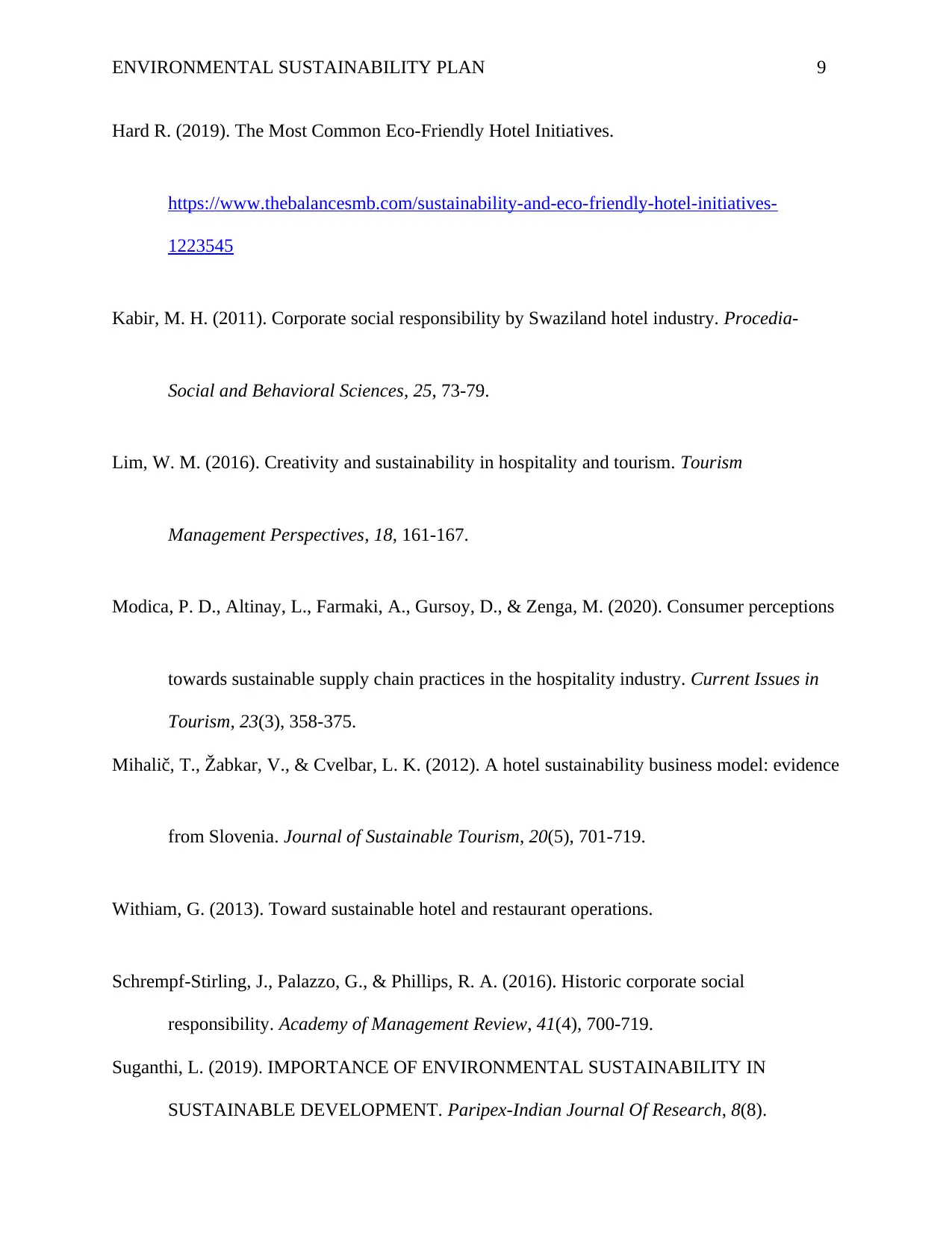
ENVIRONMENTAL SUSTAINABILITY PLAN 9
Hard R. (2019). The Most Common Eco-Friendly Hotel Initiatives.
https://www.thebalancesmb.com/sustainability-and-eco-friendly-hotel-initiatives-
1223545
Kabir, M. H. (2011). Corporate social responsibility by Swaziland hotel industry. Procedia-
Social and Behavioral Sciences, 25, 73-79.
Lim, W. M. (2016). Creativity and sustainability in hospitality and tourism. Tourism
Management Perspectives, 18, 161-167.
Modica, P. D., Altinay, L., Farmaki, A., Gursoy, D., & Zenga, M. (2020). Consumer perceptions
towards sustainable supply chain practices in the hospitality industry. Current Issues in
Tourism, 23(3), 358-375.
Mihalič, T., Žabkar, V., & Cvelbar, L. K. (2012). A hotel sustainability business model: evidence
from Slovenia. Journal of Sustainable Tourism, 20(5), 701-719.
Withiam, G. (2013). Toward sustainable hotel and restaurant operations.
Schrempf-Stirling, J., Palazzo, G., & Phillips, R. A. (2016). Historic corporate social
responsibility. Academy of Management Review, 41(4), 700-719.
Suganthi, L. (2019). IMPORTANCE OF ENVIRONMENTAL SUSTAINABILITY IN
SUSTAINABLE DEVELOPMENT. Paripex-Indian Journal Of Research, 8(8).
Hard R. (2019). The Most Common Eco-Friendly Hotel Initiatives.
https://www.thebalancesmb.com/sustainability-and-eco-friendly-hotel-initiatives-
1223545
Kabir, M. H. (2011). Corporate social responsibility by Swaziland hotel industry. Procedia-
Social and Behavioral Sciences, 25, 73-79.
Lim, W. M. (2016). Creativity and sustainability in hospitality and tourism. Tourism
Management Perspectives, 18, 161-167.
Modica, P. D., Altinay, L., Farmaki, A., Gursoy, D., & Zenga, M. (2020). Consumer perceptions
towards sustainable supply chain practices in the hospitality industry. Current Issues in
Tourism, 23(3), 358-375.
Mihalič, T., Žabkar, V., & Cvelbar, L. K. (2012). A hotel sustainability business model: evidence
from Slovenia. Journal of Sustainable Tourism, 20(5), 701-719.
Withiam, G. (2013). Toward sustainable hotel and restaurant operations.
Schrempf-Stirling, J., Palazzo, G., & Phillips, R. A. (2016). Historic corporate social
responsibility. Academy of Management Review, 41(4), 700-719.
Suganthi, L. (2019). IMPORTANCE OF ENVIRONMENTAL SUSTAINABILITY IN
SUSTAINABLE DEVELOPMENT. Paripex-Indian Journal Of Research, 8(8).
⊘ This is a preview!⊘
Do you want full access?
Subscribe today to unlock all pages.

Trusted by 1+ million students worldwide

ENVIRONMENTAL SUSTAINABILITY PLAN 10
1 out of 10
Related Documents
Your All-in-One AI-Powered Toolkit for Academic Success.
+13062052269
info@desklib.com
Available 24*7 on WhatsApp / Email
![[object Object]](/_next/static/media/star-bottom.7253800d.svg)
Unlock your academic potential
Copyright © 2020–2025 A2Z Services. All Rights Reserved. Developed and managed by ZUCOL.





